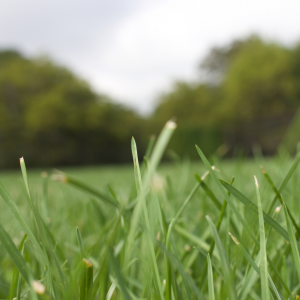 It’s time to plant Bermuda grass seed and at Wells Brothers, we have 4 different varieties in-stock. Whether you have bare dirt or are overseeding an existing lawn, these steps will help you enjoy a green lawn in no time. If you are overseeding an existing lawn, scalp and remove as much thatch as possible before seeding. Bermuda seed germinates best when soil temperatures are above 70 degrees. After the soil is prepared, sow the seeds. The seeds should be covered with no more than ¼ inch of soil. Lightly compact or roll the cover soil. Keep the seedbed moist even if it requires watering several times a day. With ideal conditions, Bermuda usually germinates within several weeks.
It’s time to plant Bermuda grass seed and at Wells Brothers, we have 4 different varieties in-stock. Whether you have bare dirt or are overseeding an existing lawn, these steps will help you enjoy a green lawn in no time. If you are overseeding an existing lawn, scalp and remove as much thatch as possible before seeding. Bermuda seed germinates best when soil temperatures are above 70 degrees. After the soil is prepared, sow the seeds. The seeds should be covered with no more than ¼ inch of soil. Lightly compact or roll the cover soil. Keep the seedbed moist even if it requires watering several times a day. With ideal conditions, Bermuda usually germinates within several weeks.
Bermuda Grass Seed Varieties:
- Common Bermudagrass (hulled): Turf Type
Good all-around warm-season grass for turf, pasture, and erosion control. Low growing, disease, and insect resistance that once established, it is drought, heat, and salt-tolerant and will withstand a lot of abuse. Hulled means removal of the hull has occurred which helps speed germination, unhulled means hull remains.
Should be planted when soil temperatures are consistently above 60 F. It requires 6-8 hours of direct sunlight per day to do well and typically does best when mowed between 1.5 and 2 inches in height. Bermuda grass thrives on fertilizer. After your lawn is established you should apply fertilizer to Bermuda two to three times during the growing season.
Lawns 1-2 lbs. per 1000 sqft Pastures 10-15 lbs. acre – $17.00 per pound or $403.25 per 50# bag*.
- Blackjack Bermudagrass: Turf Type
Deep green in color, carpet like density, good cold, drought, and traffic tolerant. Blackjack may be used on all premium turf applications such as golf course fairways, roughs, sports fields, and home lawns. Blackjack has proven well with color ratings in national Turf Trials and most locations. One unique quality is fast germination, up to 7 days faster than the similar Bermudas.
Should be planted when soil temperatures are consistently above 60 F. It requires 6-8 hours of direct sunlight per day to do well and typically does best when mowed between 1.5 and 2 inches in height. Bermuda grass thrives on fertilizer. After your lawn is established you should apply fertilizer to Bermuda two to three times during the growing season. A planting depth of 1/8 to ¼ inch is recommended.
Plant 2-3 lbs. per 1000 sqft – $11.75 per pound*.
- Arden 15 Bermudagrass: Turf Type
Turfgrass with excellent color and superior early spring green-up. A two-clone intraspecific hybrid that provides a more uniform turf compared to other seeded cultivars. Arden 15 has an improved cold tolerance which makes it an ideal solution for planting in transitional markets as far north as Tulsa, Louisville, and Richmond. This variety has a faster grow-in versus Princess 77.
Plant 1-2 lbs. per 1000 sqft – $28.00 per pound*.
- Buckaroo Blend Bermudagrass: Forage Type
Blend of Cowboy, Giant, Chilly Verde, and Jacob Bermuda grass. This mixture was put together in 2002 to help improve the forage production of straight Giant Bermuda grass. Cowboy is more aggressive than Giant in lateral growth. The protein content depends on the management of the stand but the blend does produce more leaf and less stems compared to straight Giant. It does well on many types of ground but does very well on light soils. This blend is especially useful for areas that are continually grazed.
Once established is very drought, heat, and salt-tolerant with some cold tolerance. Unlike other available forage, Bermuda grasses Buckaroo is not coated which means you have a purity of 98% seed and not 50%.
Should be planted when soil temperatures are consistently above 60 F. Requires direct sunlight and thrives on fertilizer. Planting method determines seeding rate, a proper drill rate of 5 to 10 lbs. an acre is used while broadcasting rates are increased up to 20 lbs. an acre. A planting depth of 1/8 to ¼ inch is recommended – $13.25 per pound*.
*Bermuda Grass Seed prices subject to change.





